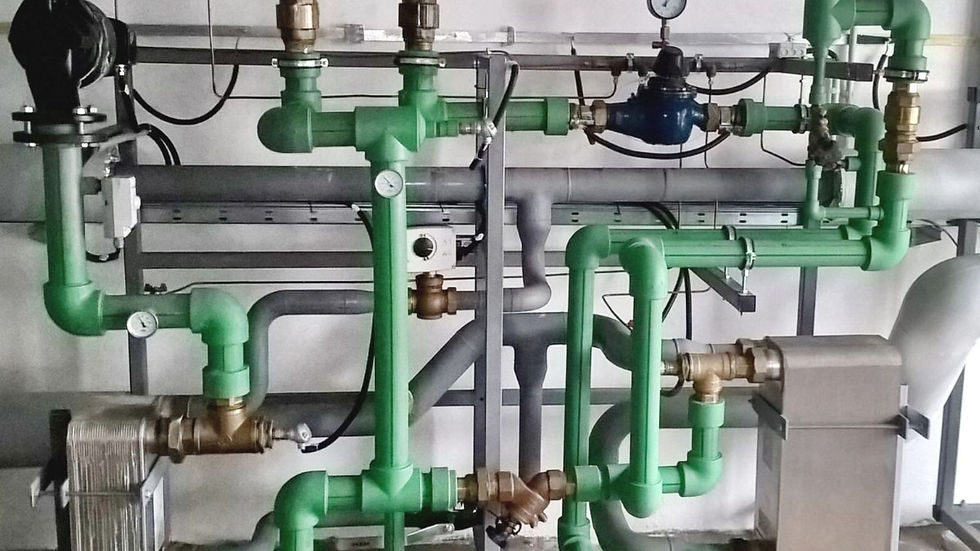Exploring the Versatility of PPR Pipes: Diverse Applications and Key Benefits
- KPT Pipes
- Jul 11, 2024
- 3 min read

Polypropylene Random Copolymer (PPR) pipes have become a cornerstone in modern plumbing and piping systems, renowned for their versatility and robust performance. These pipes are favored in various applications, ranging from residential to industrial settings, and offer an array of benefits that make them stand out against traditional materials. This blog delves into the diverse applications and key benefits of PPR pipes, highlighting why they are the preferred choice for many, including leading PPR pipes manufacturing companies in India.
Diverse Applications of PPR Pipes
Residential Plumbing Systems PPR pipes are widely used for hot and cold water distribution in residential plumbing systems. Their resistance to high temperatures and pressure makes them ideal for home installations, ensuring reliable water supply without the risk of leaks or bursts. Additionally, their smooth inner surface prevents the buildup of scale and sediments, maintaining consistent water flow.
Commercial Buildings In commercial settings such as office buildings, hotels, and hospitals, PPR pipes are indispensable. These pipes can handle high-pressure water systems efficiently and are suitable for transporting a variety of fluids, including chemicals and compressed air. Their durability and reliability reduce the need for frequent maintenance, making them cost-effective for large-scale installations.
Industrial Applications Industries often require robust piping systems that can withstand harsh conditions and aggressive chemicals. PPR pipes are perfect for such environments due to their excellent chemical resistance. They are used in industrial processes for transporting acids, alkalis, and other corrosive substances, ensuring safety and efficiency in operations.
Renewable Energy Systems PPR pipes are integral to renewable energy systems, particularly in solar water heating installations. Their ability to withstand high temperatures without compromising structural integrity makes them ideal for carrying heated water. This application is crucial in promoting energy efficiency and sustainability in buildings.
Agricultural Irrigation In agriculture, efficient water distribution is vital. PPR pipes are used in irrigation systems due to their resistance to corrosion and chemicals found in fertilizers and pesticides. They ensure consistent and reliable water supply to crops, enhancing agricultural productivity.
Marine and Shipbuilding The marine environment is harsh, with constant exposure to saltwater and varying temperatures. PPR pipes are extensively used in shipbuilding and offshore platforms due to their resistance to saltwater corrosion and durability in challenging conditions. They ensure the safe and efficient transport of fluids on ships and marine structures.
Key Benefits of PPR Pipes
Corrosion Resistance PPR pipes are highly resistant to corrosion from chemicals, acids, and alkaline substances. This characteristic ensures longevity and reliability, even in harsh environmental conditions, reducing the need for frequent replacements and maintenance.
Low Thermal Conductivity The low thermal conductivity of PPR pipes helps maintain the temperature of transported fluids, whether hot or cold. This property results in energy savings and efficient operation, making them ideal for various applications, including residential heating systems and industrial processes.
Smooth Internal Surface The smooth inner surface of PPR pipes prevents scaling and buildup of deposits, ensuring consistent water flow. This feature reduces maintenance efforts and prolongs the lifespan of the piping system.
Noise Reduction Unlike metal pipes, PPR pipes dampen the noise of water flow, providing a quieter plumbing system. This benefit is particularly advantageous in residential and commercial buildings where noise reduction is essential for comfort.
Easy Installation PPR pipes are lightweight and easy to handle, making installation quicker and more cost-effective compared to traditional materials. They can be joined using heat fusion techniques, which ensure strong, leak-free connections, reducing the risk of future leaks and associated repairs.
Environmental Sustainability PPR pipes are recyclable and have a low environmental impact throughout their lifecycle. They contribute to green building certifications by promoting sustainable construction practices. Leading pipes manufacturing companies in India are increasingly adopting PPR pipes to align with global sustainability standards.
Long Service Life With proper installation and maintenance, PPR pipes can last for several decades. Their durability and reliability offer a long-term solution for plumbing and piping needs, reducing the total cost of ownership over time.
Conclusion
In conclusion, the versatility and numerous benefits of PPR pipes make them an exceptional choice for various applications. From residential plumbing and commercial buildings to industrial processes and agricultural irrigation, PPR pipes demonstrate their value in enhancing efficiency, reducing maintenance costs, and promoting sustainability. As technology advances and environmental concerns grow, PPR pipes are set to play an even more significant role in shaping the future of plumbing and infrastructure. For those seeking reliable and eco-friendly piping solutions, partnering with a reputable Pipes manufacturing company in India, such as KPT Pipes, can ensure access to high-quality PPR pipes that meet the demands of modern construction and industry. Contact KPT Pipes for any queries related to PPR pipes or for expert advice on your piping needs.




Comments